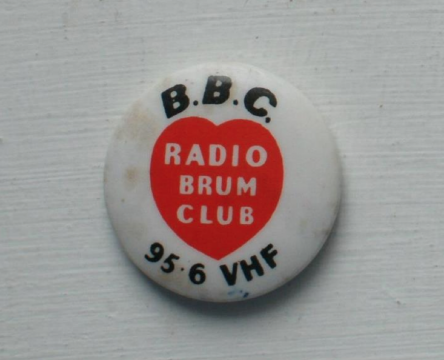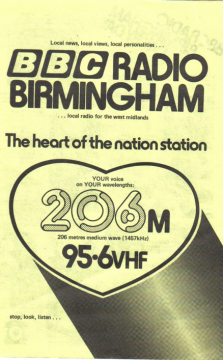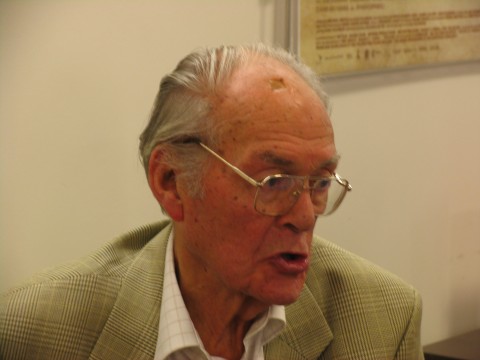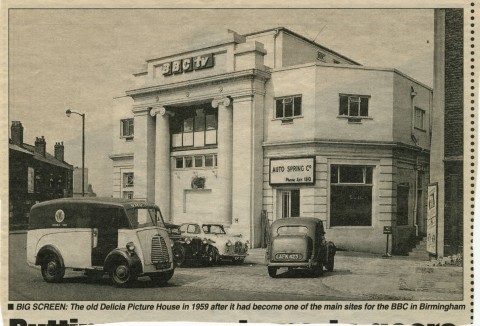THE CHALLENGES OF PUTTING RELIGION ON THE AIR
In the first Midlands edition of the Radio Times featuring the start of Radio Birmingham from Pebble Mill, the producer appointed to look after religious programming Terry Doughty asked ‘Is God Local?’ Since God was already regional and certainly National there did not seem much doubt that with the arrival of Local Radio God would certainly be local. But in what ways would this become apparent? The local stations were set up on minimal budgets (at the time they were classed as ‘provisional’ services and throughout their early years were constantly being threatened with some form of restriction or even closure.) All the producers were charged with seeking out local folk who would be interested in broadcasting their interests on the air with the help of basic training and the use of a producer’s time and even a staff presenter if required. There were some very strange interests covered away from the staple diet of News and Current affairs which were the responsibility of the Newsroom staff with their reporters and stringer journalists. So how did it work out for God in his local manifestation? It became clear that whilst the established churches were interested they were not prepared or even able to provide much more than an advisory committee which would attempt to back the religious programmes producer (who of course already had many other responsibilities in other areas. The first religious producer for instance had the brief also for countryside and environment topics, blind listeners and rotared production of mainline sequence programmes, as well as newsreading duties in this brave new multiskilled world of local radio. Certainly the ‘old guard’ BBC types at the Mill were surprised, amazed or even unsettled at the increasing number of vicars and nuns etc turning up at reception asking for access to the local studios.
When I took over in the middle 70s the three main strands were a weekly magazine called Church in Action, presented and researched by a local vicar on day release from his parish and using a host of lay people, nuns, church leaders to do the interviews. There were irregular , usually live, broadcasts of Christian worship from local churches and a daily ‘Thought for the day’ talk in the breakfast sequence. The idea of non-christian broadcasts were some way off. Later a fully dedicated minister would take over the job and in my time in the 70s and 80s these were Wilfred Bridge from the Methodists and Michael Blood from the Church of England. Their arrival greatly improved things and rationalised the production, with at first me acting as Editor but later Michael taking over completely and in his time seeing the move to the Mailbox.
To me, over the years the challenges of broadcasting religion were tremendous, frightening and at times downright hilarious and nowhere more was this true than in the transmission of Services of Worship. Preparing to record a public lunchtime service for the week of Christian unity one year for later transmission that evening I became embroiled in an urgent and increasingly animated debate with the leaders of all the denominations on the order in which they should process into Birmingham Cathedral to begin procedings. The Bishop of the time, the great Lawrence Brown, simply said something like ‘well Bishops always come in last;’ and went to the back of the vestry and waited for the others to sort the problem out. I thought I ought to pop out into the Cathedral to explain to the organist who was to start the event forgetting his pre arranged cue was to be me opening the vestry door…so as I opened the door he started playing and I had no choice but to shepherd the assorted clerics through the door in the order in which they were randomly disposed about the place.
On another occasion, we were recording the very first service of the new United Reformed church at Weoley Castle, and halfway through the sermon, well into the service, the engineer suddenly informed me that the tape machine had stopped recording. He solved the problem quickly enough to get the last prayers and hymns, but I was faced with the problem of having a recording of the start and the end of the service but no middle and certainly no sermon, which was all about the terrific changes being wrought by this first uniting of denominations for generations. As the congregation beat a hasty retreat towards the celebration bunfight I had to find the minister, Ernest Crutchley, and explain the predicament. With true understanding he immediately agreed to come into Pebble Mill that evening when the service was to be broadcast and repeat his sermon ‘live’ in the studio.
On the tenth anniversary of the consecration of Coventry Cathedral, we were broadcasting the service live but got into musical timekeeping problems as the choir processed from the West door, but the organ stayed still at the other end of the building resulting in an unusual and unintended syncopation which slowly resolved itself as the choir got closer to the organ.
Producing Harvest festival from Droitwich nearly resulted in the fracturing of the traditionally delicate relationship between organist and vicar as we could only get the choir and organ balanced if the altar was dismantled. …the vicar supported the idea, the organist/choirmaster didn’t. My skills as a producer and diplomat lurched forward in giant strides that day.
Later, I was honoured to be responsible for the first broadcasts of non-christian worship anywhere in the country. We began with Sikh worship from the Gurdwara in Graham street, miraculously ‘opting in’ live on day three of a three day service. No mean feat and only possible with the enthusiastic co-operation of the worshippers and our commentator ,John Plummer from the Birmingham organisation ‘All faiths for one race’.
Hindu worship soon followed with Engineer Stuart Miller having to solve the problem of how to position a microphone centrally over a fire ceremony service without it melting…it did.
For the Muslim event we went to a recce at some large houses used by that community in the days before the Birmingham Mosques were built. I explained to the Imam that in order for the commentator to see what was going on we would need to have visual access from the room next to the worship area. With horror we watched as he summoned a member of the community who literally smashed a hole through the offending wall with a sledgehammer! This broadcast also gave rise to what the Manager, Jack Johnston saw as a possibly premature end to his career as complaints were received that as we were by now broadcasting on Medium wave AM as well as FM, that although the service was heard clearly in the Midlands on AM, listeners towards London on AM were hearing Radio London’s pop programme (which was being broadcast at the same time) in the background. This was at first seen as a sop to the host community by playing music in the background until the technical anomaly was explained to the complainants.
Nowadays, for a whole variety of reasons religion on Local Radio has largely disappeared except for sunrise magazines on Sunday mornings, no live worship of any denomination or faith and the morning thoughts have gone too.
Perhaps God isn’t as local as we, or he, had expected. However for me it was one of the most challenging, exciting and, yes, rewarding times in my career.
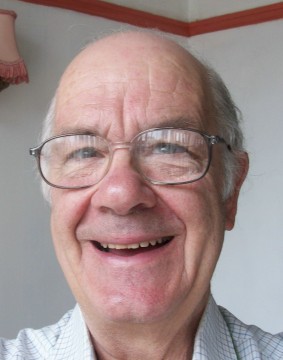
Pete Simpkin
May 2013
